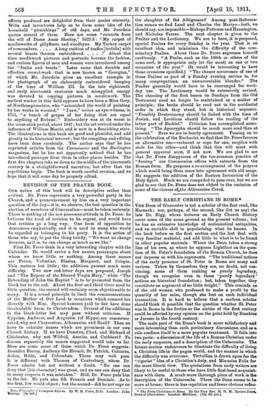REVISION OF THE PRAYER BOOK.
Oun notice of this book will be descriptive rather than critical. Dr. Frere represents a very powerful party in the Church, and a pronouncement by him on a very important question of the day—it is, we observe, the test question in the election of members of Convocation—must be taken seriously. There is nothing of the nen possumus attitude in Dr. Frere : he believes the need of revision to be urgent, and would have that revision go a long way. One form of opposition he denounces emphatically, and it is used by many who would be regarded as belonging to his party. It is the action of those who say, to put the thing briefly, " We want no change because, as it is, we can change as much as we like."
First Dr. Frere deals in a very interesting chapter with the Calendar. He would excise a few names, personages about whom we know little or nothing. Among these names are Prisca, Valentine, Blasius, Margaret, and Crispin. This matters but little ; the additions present much more difficulty. Two new red-letter days are proposed, Joseph and " The Repose of the Blessed Virgin Mary," while " The Beheading of John the Baptist " is to be promoted from the black list to the red. About the first and third there need he little question ; the second will certainly seem objectionable to many. It is a sound principle to limit the commemorations of the Mother of Our Lord to occasions which connect her directly with Him. Special honours raid to her have done incalculable bairn to Christendom. several of the additions to the black-letter list may pass without criticism. If Cyprian, Ambrose, and Augustin (of Hippo) are commemo- rated, why not Chrysostom, Athanasius, and Basil P Then we have to consider names which are prominent in our own Church history. If we have Dunstan, Chad, and Richard of Chichester, why not Wilfrid, Anselm, and Cuthbert? To discuss separately the names suggested would take us far. Here are some more of those which Dr. Frere suggests: Benedict Biscop, Anthony the Hermit, St. Patrick, Columba, Aidan, Hilda, and Columban. These may well pass. It is different with Thomas of Canterbury, whom Dr. Frere admits but not without a doubt. "No one can deny that [his character] was great, and no one can deny that in many respects it was mistaken." Still, Dr. Frere puts him in the list. He puts also SS. Francis and Dominic. As to the first, few would object ; but the second—did he not urge on Some Principles cf Liturgical Reform. By W. H. Frere, D.D. London : John *array. [5w. net.] the slaughter of the Albigenses P Among post-Reforma- tion names we find Laud and Charles the Martyr—both, we should say, are impossible—Bishops Patteson and Hannington, and Nicholas Ferran. The next chapter is given to the Psalter and the Lectionary. We are to have, it is proposed, special Psalms for every Sunday in the year. That is an excellent idea, and minimises the difficulty of the com- minatory Psalms. About these Dr. Frere expresses himself cautiously. " A Psalm, such as the 109th or others of the same sort, is appropriate only (at the most) on one or two occasions of the year." (It would be interesting to have these occasions specified.) " The chance occurrence of one of these Psalms as part of a Sunday evening service is, for many congregations, an unwarrantable blunder." The Psalter generally would have to be rearranged for week- day use. The Lectionary would be extensively revised. The choosing of the first lesson on Sundays from the Old Testament need no longer be maintained as a matter of principle ; the books should be read not in the accidental order in which they stand, but in historical sequence. " Possibly Deuteronomy should be linked with the time of Josiah, and Leviticus should follow the reading of the latter part of Ezekiel." Criticism has accomplished some- thing. " The Apocrypha should be much more read than at present." Here we are in hearty agreement. Passing on to the celebration of the Eucharist, we find that Dr. Frere favours an alternative use—vestment or cope for one, surplice with stole for the other—and think that this will meet with general approval soon, if not now. We are glad to see that Dr. Frere disapproves of the too-common practice of " farsing " our Communion offices with extracts from the Roman form. He proposes a re-arrangement of the prayers which would bring them more into agreement with old usage. He suggests the addition of the Eastern Invocation of the Holy Spirit. Much we are compelled to pass over, but we are glad to see that Des Frere does not object to the omission of some of the clauses otthe Athanasian Creed.




































 Previous page
Previous page